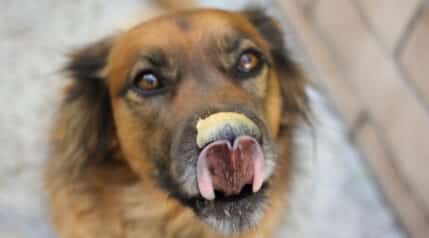For centuries, rice has been one of the most popular food sources in the world. In fact, around half the world’s population depends on it as a staple food. But can dogs eat rice? Is it safe for them to eat, and is it good for dogs with sensitive stomachs?
The answer is yes, dogs can eat rice, and it can be a great source of carbohydrates for dogs. Domestic dogs are omnivores, which means they can digest meat and plants, including grains such as rice. Rice contains nutrients that support the healthy functioning of the body’s systems, including fiber, vitamin B, vitamin D, iron, calcium, and vitamin E.
If you look closely at your pet’s food label, you may notice rice is a primary ingredient. As well as acting as an important source of nutrients, there are some occasions when rice might be particularly beneficial to your pet, such as when he has an upset stomach. So, let’s have a closer look at when and how rice can be incorporated into your dog’s diet.
Is Rice Safe for Dogs?
In most circumstances, both white and brown rice are safe for dogs. It’s also usually one of the most common ingredients used in many commercial pet food formulas. In fact, rice is commonly used in dog food that helps resolve smelly problems in gassy dogs. It’s used to bind some of the other ingredients together to help form many dry kibble formulas. Let’s look at rice, and when it’s safe to include it in your pup’s diet.
Rice in Pet Food

If rice is one of the main ingredients in your pet’s commercially prepared food, then it is perfectly safe to feed every day. Commercially sold dog foods have been carefully formulated and balanced. However, home-cooked rice should not make a daily appearance in your dog’s bowl. The only exception is if you’ve received specific instructions from your vet. Rice is best enjoyed in moderation.
There is limited scientific research to support the feeding of rice to dogs. However, we know rice is a safe food source for dogs and they can easily digest it. We know from research that dogs with gastrointestinal problems may benefit from eating bland, easy-to-digest foods to ease the symptoms. We also know that it contains many essential nutrients that can help your pup stay healthy.
Nutritional Benefits

Rice is packed full of nutrition. It is a carbohydrate, which provides your pet with slow-release energy throughout the day. It’s also full of minerals and vitamins that support the healthy functioning of the body systems, including B vitamins, vitamin D, vitamin E, calcium, and magnesium.
White rice is easy for dogs to digest and is low in fiber. Brown rice is harder to digest, as it still has its outer shell. But this does make it more nutritionally dense, as all the nutrients are stored in that outer shell. As well as being higher in fiber and protein, brown rice has a lower level of starch.
Cooked Rice for Digestive Problems

In cases of diarrhea or vomiting, it used to be recommended to feed cooked white rice to your dog for a few days. You can also include a little boiled chicken or white fish. This is commonly referred to as a ‘bland diet.’ Bland diets are easy to digest and helps to bind stools. However, a homecooked chicken-and-rice diet is deficient in many vitamins. It’s now considered preferable to use a canned chicken-and-rice diet from the vet.
Dogs with pancreatitis (inflammation of the pancreas) need to eat a low-fat, easily digestible diet, so rice can be a great source of nutrition for them. If your pet suffers from pancreatitis, your vet will discuss a long-term diet plan with you.
As dogs get older, their digestive systems change, and so do their nutritional requirements. Dogs with reduced activity levels need to consume fewer calories to prevent weight gain. Care should be taken when it comes to portion sizes. White rice can be quite calorific. So, brown rice might be a better choice for older dogs as it contains more fiber and protein.
Cooked Rice For Doggy Diarrhea

White rice is low in fiber and easy to digest. This makes it a perfect choice for cases of diarrhea. In this situation, brown rice should be avoided since it’s harder to digest. White rice actually helps to bind the stools by absorbing water in the gut. It then gives the gut a rest by reducing peristalsis (contraction of the intestines that help push contents through).
It is usually advised to feed your dog little and often, so a small portion of cooked white rice with a little boiled chicken, or cooked egg every few hours. As previously mentioned, the canned meals provided by the vet are more ideal than cooking it yourself at home.
If your dog has diarrhea, he must see a vet. Although most cases of diarrhea are self-limiting, many dogs require further treatment. If your pup is lethargic, not wanting to eat, or has excessive or bloody diarrhea, they must see a vet as soon as possible.
Dogs & Bland Diets
Feeding a bland diet for upset stomachs has long been recommended by vets. However, research into its benefits is limited. It is widely recognized that a bland diet, such as rice and boiled chicken, helps alleviate symptoms like vomiting and diarrhea. Cottage cheese can also be used in moderation as part of a bland diet, as can regular baked potatoes.
It is important to feed through diarrhea to help maintain the gut barrier. It’s also important to regulate calorie intake. We know that feeding dogs a highly digestible and low-fat diet during episodes of vomiting or diarrhea can improve symptoms through reduced gastric emptying and reduced fecal residue (fewer stools).
However, it’s also important to remember that white rice and boiled chicken together do not make a balanced diet. In fact, it is deficient in at least 17 vitamins and minerals. This may make it harder for your pet to recover from illness. While it may be a good stop-gap overnight, it should be replaced with a canned, highly digestible, complete, and balanced diet as soon as possible.
When is Rice Bad for Dogs?
Just like all things, even rice can be harmful to dogs in the wrong circumstances. Let’s take a look at the circumstances when dogs shouldn’t be eating rice, and when it may be time to consult with your local veterinarian.
In Large Amounts

The amount of rice you feed to your pet will depend on their age, breed, and weight. Overfeeding your pup will cause weight gain, and rice is very calorific, so care should be taken to avoid your pet piling on the pounds.
The 10% rule should be followed; so only 10% of your pet’s daily food intake should be rice unless advised otherwise by your vet. If you are feeding commercially prepared food containing rice, make sure you know your pet’s current weight, and follow the instructions on the packaging.
Certain Rice Preparations

Like with any food fed correctly, rice is a good ingredient in your pets’ diet. But some preparations of rice may not be so safe for your pet and could cause some problems.
Uncooked rice is not safe for dogs, as it absorbs moisture in their digestive tract and can cause constipation, diarrhea, and indigestion. If your dog has eaten uncooked rice and seems unwell, contact your vet for advice.
Dogs can only eat plain, cooked rice. When preparing it, make sure you do not add any salt, oils, or seasoning, as these ingredients can cause an upset stomach. It’s also important to make sure that there are no ingredients that aren’t doggy safe included in the rice. Certain food items like garlic and onion can be toxic to dogs, so make sure your rice doesn’t include something else that could harm your pup.
Is Rice Dangerous for Certain Dogs?

Some dogs suffer from allergies to grains, including rice. Although grain-free diets have become very trendy and widely available, dogs with grain allergies need to consume only grain-free foods on the recommendation of their veterinarian. Even then, they are likely to be intolerant to one or two grains, not all of them. It’s more common for dogs to be allergic to corn than rice.
If your dog has diabetes, it is important to note that rice can pose a problem. It has a high glycemic index, meaning it can increase blood sugar levels if eaten too often or in large quantities. If you would like to feed your diabetic pet rice, it is best to speak to your vet first.
Frequently Asked Questions
Is rice good for dogs every day?
Rice should be fed to dogs in moderation. Rice alone is not a balanced diet, and feeding too much rice too often can lead to weight gain. If you feed your dog a commercially prepared food containing rice, this is fine to feed everyday as it has been carefully balanced. If you are feeding your canine companion a home-prepared diet, you should follow a recipe written by a qualified veterinary nutritionist.
It is nutritionally balanced to feed cooked rice?
Feeding cooked rice alone to dogs on a long-term basis is not nutritionally balanced, and will not provide them with the nutrients they need to stay healthy. Rice can be an important part of a balanced diet, but dogs need to consume other sources of protein, vitamins, and minerals through meat and vegetables.
If Fido has an upset stomach, it is ok to feed cooked rice for a few days. But once they have recovered their regular food should be slowly reintroduced. Your vet can provide you with guidance and support on an appropriate diet for your pet.
Is rice okay for dogs with pancreatitis?
Dogs with pancreatitis need to consume a low fat, easily digestible diet. White rice is very easy to digest, so may be beneficial to dogs with pancreatitis. However, these dogs are prone to dangerous upsets, so speak to your vet first before introducing rice to your dog's diet if they have pancreatitis.
Can uncooked rice kill dogs?
Uncooked rice is bad for dogs as it absorbs moisture in their digestive tract. It can cause constipation, diarrhea, and indigestion. It is very unlikely that eating uncooked rice will prove fatal, but if your dog has eaten uncooked rice and is unwell, seek advice from your vet.
What should I do if my dog ate uncooked rice?
If your dog has eaten uncooked rice, you should contact your vet for advice. Uncooked rice can cause constipation, diarrhea, and indigestion.
Final Thoughts
The short answer to this is yes, you can definitely feed your dog rice. Not only is it a great source of carbohydrates, fiber, minerals, and vitamins, but it can also help dogs recover from diarrhea and vomiting. In moderation, it can also become a part of their daily diet. But it’s important to always speak to your vet first before making any changes to your pup’s diet.





